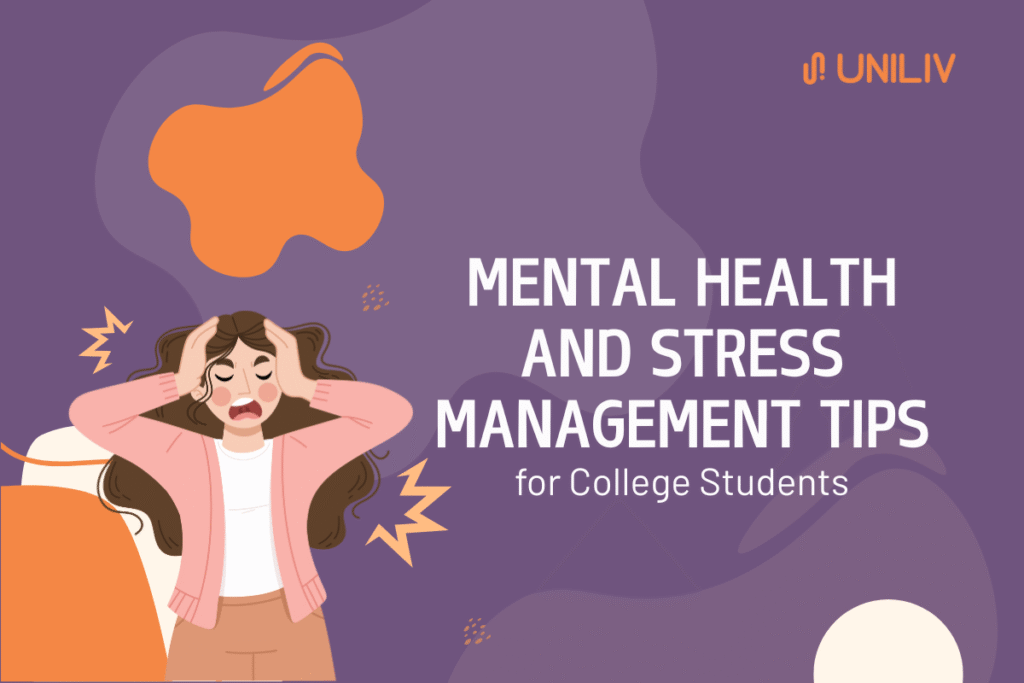Mental Health and Stress Management Tips for College Students

Table of Contents
ToggleCollege life is the most transformative period of an individual’s life. New experiences, new adventures, academic and social challenges, character development, and personal growth bring excitement among students—but can be overwhelming too. Balancing academic life, social dynamics, and sometimes part-time jobs or internships often results in higher levels of stress, anxiety, and depression among students. That’s why understanding mental health and stress management tips for students is more important than ever
WHAT TRIGGERS STRESS AND MENTAL HEALTH CONCERNS AMONG STUDENTS?
Academic Pressure
Maintaining good grades, grabbing scholarships, assignment/presentation deadlines and keeping up with parent’s expectations are the most common challenges that students face in their college life. This desire to excel and meet personal expectations can lead to burnouts, stress and anxiety.
Financial Stress
College is getting more expensive day by day. A student is usually unaware of financial management before entering college. Managing tuition fee, course fee, buying textbooks, transportation fee etc. can be pretty stressful for students specially the ones residing from low-income background.
Social Challenges
Apart from academics, maintaining a good social life can be quite grueling. One is expected to make new connections and networks and balance the old ones too. Keeping up with family, friends and partners all at once can be hectic. One must figure out what relation is actually supportive and which is a burden.
Future Concerns
Getting out of school where everything was laid out and planned and entering a world full of choices and challenges is mentally taxing. From choosing what to carry in lunchbox today to choosing a whole career can put unimaginable pressure over a student. To grab reputed job in future, a student is expected to acquire skills and experience beforehand for which they work part time and do internships which sometimes is difficult to manage simultaneously.
You Can Also Check: College Move-In Day Checklist: What to Bring & What to Skip
TIPS FOR MAINTAINING GOOD MENTAL HEALTH AND MANAGING STRESS LEVELS
Create a Good Routine
Time management can be one of the most important Tool in student’s life. With freedom comes responsibility. Balancing everything at once can be disorderly and chaotic. It is important to give enough time for everything, not more not less. Assigning particular time slots for assignments, self-study, sleep, eating and socializing can be very helpful. It will help you to put the most important tasks on first and prioritizing accordingly. Also, you should write down your to-do lists and expectations for the day one night prior. This will help in reducing wastage of time and energy on the upcoming day.
Physical Workout
Being active can help reduce stress and fatigue. Physical Activities releases endorphins which is scientifically proven to uplift mood. Exercising is a natural stress reliever. Additionally, it also keeps you fit and healthy.
Prioritizing Sleep
Sleep is most likely to be sacrificed during busy college weeks. Students often pull all nighters to meet deadlines or study for exams. Sleeping schedule is not given much importance by students which results in long term health issues and inefficiency. One must take complete 7-9 hours of sleep per day to function efficiently, improved productivity and avoid fatigue.
Stay Connected
Some people get invested in their professional so much putting their personal relations on stake. It is very important to maintain a balance between personal and professional life. Having someone to talk to in tough times can help in reducing stress and provides emotional relief.
Never Hesitate to Ask for Help
Because of stereotypes of the society, people often hesitate in asking for professional help. Reach out to professionals such as college councilors or experts. They might give better advises or solutions to your problems and invites a professional perspective to your problems.
CONCLUSION:
Mental health is more of a need than want. Stress is inevitable but should not be a burden. It’s brave to ask for help when needed and it’s not okay to bottle up emotions, this can be very overwhelming. You should know where to put in your energy and learn prioritizing. Good mental heath is worth much more than wealth. Stress and mental health are interdependent, with stress comes bad mental health and visa versa. Investing in mental health is one of the best decisions a student can make.